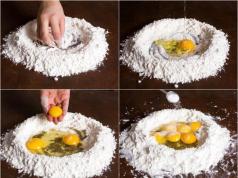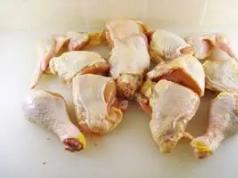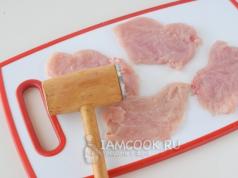Dear reader, if before learning English you got acquainted with the names of Latin letters in chemistry or physics ( H 2 O - "ASH-Two-O", mv 2 /2 - "EM-VE Square in Half") or at least when playing chess ( e2-e4 - "E Two - E Four"), then the transcription of English letters may have become an unpleasant surprise for you.
Out of habit, such names of English letters as A - "hey", E - "and", I - "ay" And R - "a"(in the latter case the sound " R"although it is implied, it is very often not pronounced or pronounced very quietly). And the Latin letter W, which in Russian is traditionally called " double-ve", in English called " double", i.e " double U", although its bottom edge in the printed image has two sharp, not rounded protrusions. This was because in the old days U And V did not differ. And there are also differences between American, British and Scottish English, between official speech and colloquial.
And still not to be confused with G - "ji", J - "jay" And H - "h", and explain to especially gifted telephone interlocutors that "pi"- this P, not a Greek letter π (the ratio of the circumference of a circle to its diameter ( ≈3,14 ), while π pronounce in english "share".
Perfect automatic knowledge of the names of English letters is a very important skill that should not be neglected when learning English. Why is this necessary, isn't it better to work out with grammar or expand your vocabulary? But the pronunciation of letters is not theoretical phonetics divorced from life. The fact is that English abbreviations are almost always spelled, and you may also be asked to spell your name or some letter code ( "Could you spell your name, please?" ).
And if you do not know the names of the letters, then you will have to blush and mumble something unintelligible. And some English abbreviations entered the Russian language with incorrect pronunciation, for example VIP should be pronounced like "wee-ah-pee", but already rooted in Russian as "VIP". When abbreviations have several identical letters in a row, they are often pronounced using the words "double-" ("double") and triple- ("triple"), for example, when you need to give an address on the Internet, www pronounced "triple double-u".
But what if you need to pronounce some letter code in radio traffic in the airspace, or at sea? It is impossible to allow misunderstandings and hitches in the negotiations between pilots and the air traffic controller, or in negotiations between the English-speaking military and their non-English-speaking allies, so that the artilleryman does not mix up the code for the square "i" how "e".
To avoid ambiguity or misunderstanding, a code is used to represent letters with words, known as "NATO code"(phonetic alphabet of the International Civil Aviation Organization ICAO). Surprisingly, even this code has flaws in certain situations, which is why in some cases the names of the letters in it had to be replaced.
And if you want the English alphabet with transcription to unobtrusively scroll before your eyes every time you go to Yandex, then you can install a Yandex widget for yourself that will scroll the letters of the alphabet forward, backward or randomly.
Everyone who begins to learn English, necessarily at the first stage of their journey, encounters the alphabet and the pronunciation of its letters. It is very important not only to know how the letters are called, but also in general with Russian pronunciation.
For the correct pronunciation of the alphabet Below is a table of all letters with both English and Russian transcriptions. Of course, you need to know English transcription - it is used in any dictionary, it is just as important as knowing the alphabet itself. But for beginners who have not yet fully mastered English transcription, we give the sounds of the English alphabet in Russian letters.
| Letter | Name | Pronunciation | Russian entry letter names |
| a | a | Hey | |
| b | bee | bi | |
| c | cee | si | |
| d | dee | di | |
| e | e | And | |
| f | ef | ef | |
| g | Gee | ji | |
| h | aitch | h | |
| i | i | ah | |
| j | Jay | jay | |
| k | kay | kay | |
| l | el | ||
| m | em | Em | |
| n | enn | en | |
| o | o | OU | |
| p | pee | pi | |
| q | cue | cue | |
| r | ar | a, ar | |
| s | ess | es | |
| t | tee | ti | |
| u | u | Yu | |
| v | vee | in and | |
| w | double-u | [`dʌbl`ju:] | double |
| x | ex | the ex | |
| y | wy | wye | |
| z | zed, zee | , | zed, zee |
As for the letter Z, the British version is “zed”, the American one is “zi”.
It may seem that the English alphabet is more complicated than the Russian one. But actually it is not. There are only 26 letters in it (for comparison, in Russian - 33), and only 6 of them (A, E, I, O, U, Y) are vowels. Unfortunately, these vowels do not always correspond to the alphabetic pronunciation. For example, Aa - in the alphabet it reads like [hey]: “cake” - cake, “later” - later, but not in the words “bag” - luggage, “flag” - flag and many others.
Here it must be said that in English there are stressed and unstressed syllables. Let's consider the case of a stressed syllable. Division can also be observed here - the stressed syllable can be open and closed. Open syllables end in a vowel, and closed syllables end in a consonant. Here are examples of stressed open syllables: “la-bel” is an inscription, “ta-ke” is to receive, and so on. And here are examples of stressed closed syllables: “rab-bit” is a rabbit, “dog” is a dog, “win-dow” is a window, and so on. Please note that in the first case, the stressed vowels are read exactly the same as they sound in the alphabet.
Consider all vowels:
Vowel A
Open syllable: “la-ter” [’leitə] – later
Closed syllable: “cat” - cat
Vowel E
Open syllable: "he" - he
Closed syllable: “bend” - bend
Vowel I
Open syllable: “li-lac” [’lailək] - lilac
Closed syllable: “lift” - elevator
Vowel O [?u]
Open syllable: “pho-to” [’fəutəu] — photography
Closed syllable: “got” - received
The vowel U
Open syllable: "cu-te" - cute
Closed syllable: "numb" - numb
Vowel Y
Open syllable: "type" - type
Closed syllable: “myth” - myth
 Okay. Now, continuing to answer the question of how the English alphabet is read, we need to talk about unstressed vowels. The vowels a, o, u, not being stressed, turn into the sound [ə], and the vowels e, i, y in the same case become the sound [i]. In this case, it is only necessary to appear after them the letters r, they all become [ə]. You can easily see this for yourself: “pre-fer” - to prefer, “pla-yer” ['pleiə:] - player, “doctor” ['dɔktə:] - doctor.
Okay. Now, continuing to answer the question of how the English alphabet is read, we need to talk about unstressed vowels. The vowels a, o, u, not being stressed, turn into the sound [ə], and the vowels e, i, y in the same case become the sound [i]. In this case, it is only necessary to appear after them the letters r, they all become [ə]. You can easily see this for yourself: “pre-fer” - to prefer, “pla-yer” ['pleiə:] - player, “doctor” ['dɔktə:] - doctor.
It is also worth paying attention to consonants: B, D, F, H, J, K, L, M, N, P, T, V, W, X, Z - they are also read respectively [b], [d], [ f], [h], , [k], [l], [m], [n], [p], [t], [v], [w], [x], [z]. Things go more complicated with the rest of the consonants.
So, for example, the letter C will be - before e, i, y, and in all other cases - [k]. See: “cinema” [’sinəmə] – cinema, “cure” – treatment.
The letter G - before e, i, y goes into, and in other cases as [g]: “ginger” [’dʒindʒə] - ginger, “goat” - goat, goat.
And S at the beginning of a word and after deaf consonants K, F, P and T is read as a sound [s], and, on the contrary, after voiced and other cases - [z]: “Simon” ['saimən] - Simon, “books” - books, "finds" - finds, "wise" - wise.
The letters R and Q are also difficult. So R is often simply discarded, dragging out the sound (“car” - car), but the word with R will be read with R (“Riko” - Riko). The letter Q can give two options - or - compare "quick" - quickly and "queue" - queue.
You know that in English words are not always read exactly as they are written. That is why it is worth giving enough time to the rules for reading English letters individually and in various combinations. In the course of this lesson, we will continue to get acquainted with the rules for reading English letters. We will consider the features of reading the consonants C, G and S and some of their combinations.
If the consonant C comes before the vowels A, U and O, then it is read as [k]. For example: cat - cat, candle ["kændl] - candle, cut - cut, car - car, cow - cow, cup - cup. Before other consonants, the letter C will also be read as sound [k]. For example: cloud - cloud, clown - clown (Fig. 2), actor ["æktə] - actor, doctor ["dɔktə] - doctor, picture ["pɪkʧə] - picture.

In combination with the letter K, the consonant C gives the sound [k]. For example: black - black, back - back, duck - duck, brick - brick, clock - wall clock (Fig. 3), bucket ["bʌkɪt] - bucket.

Rice. 3. Wall clock ()
The letter combinations CH and TSN are read as the sound [ʧ]. Please note that this English sound is not as sonorous as in the Russian word "hours". In English, it is softer and similar to the sound when mothers try to calm their baby: “Ch-ch-ch, ch-ch-ch.” Practice pronouncing the sound [ʧ] correctly on these words: chin [ʧɪn] - chin, cherry ["ʧerɪ] - cherry, chicken ["ʧɪkɪn] - chicken, church [ʧɜːʧ] - church, branch - branch, match - match, catch - catch.
Before the vowels I, Y, and E, the consonant G is read as [ʤ]. For example: gym [ʤɪm] - gym, ginger ["ʤɪnʤə] bread - gingerbread (Fig. 4), page - page, cage - cage, large - large. The cage is large. - The cage is large.

Rice. 4. Gingerbread ()
Before the vowels A, O and U, the consonant G will be read as [g]. For example: game - game, go - go, gun - pistol, guitar - guitar, gate - gate, goat - goat. The letter G is also read (like the sound [g]) at the end of a word and before other consonants. For example: bag - bag, big - big, frog - frog (Fig. 5), green - green, gray - grey, glass - glass.

The grass is green. - The grass is green.
My bag is big. - My bag is big.
Unfortunately, not all English words are read according to the rules. There are also exceptions. There are such exceptions for the letter G. Before the vowels I, Y and E, it will not always be read as [ʤ]. Sometimes the letter G will be read as [g]. For example: gift - gift, girl - girl, give - give, tiger ["taɪgə] - tiger, geese - geese, finger ["fɪŋgə] - finger. However, in some cases, the letter G is read completely uncharacteristically. For example, the letter combination GH is pronounced as [f]. For example: enough [ɪ "nʌf] - enough, laugh - laugh, cough - cough (Fig. 6).

In some cases, the combination GH at the end of a word is not pronounced at all. For example:
dough - dough, through [θruː] - through, through. The letter combination IGH reads like . For example: night - night, light - light, fight - fight, knight - knight (Fig. 7).

Practice reading the poem correctly.
star l igh t, star br igh t
Star on the left, star on the r igh t
The consonant letter S has several reading rules.
At the beginning of a word, S is read as a sound [s]. For example: sand - sand, sing - sing, sea - sea, sun - sun. The consonant S will give the sound [s] before voiceless consonants. For example: post - mail, ghost - ghost, toast - toast, desk - desk. In addition, the consonant S will produce the sound [s] after voiceless consonants. For example: books - books, cats - cats, chips [ʧɪps] - french fries, grapes - grapes (Fig. 9). 
Rice. 9. Grapes ()
At the end of a word, after voiced consonants, the letter S will be read as [z]. For example: jeans [ʤiːnz] - jeans, clothes - clothes. Between two vowels, the letter S is read as [z]. For example: rose - rose, nose - nose, close - close, cheese [ʧiːz] - cheese. However, there are exceptions to this rule, that is, words in which the letter S between two vowels makes the sound [s]. For example, house - house, mouse - mouse (Fig. 10), goose - goose. His mouse is in the house. - His mouse is in the house.

The combination of letters SS is read as one sound [s]. For example, grass - grass, lesson ["les (ə) n] - lesson, glass - glass.
The letter combination SH is read as [ʃ]. For example: ship [ʃɪp] - ship, sheep [ʃiːp] - sheep, shirt [ʃɜːt] - shirt, shorts [ʃɔːts] - shorts, fish - fish, bush - bush.
Practice by reciting this tongue twister:
She sells sea shells on the sea shore. - She sells shells on the coast.
Bibliography
- Afanas'eva O.V., Mikheeva I.V. English language. Grade 2 - M: Bustard, 2014.
- Biboletova M.Z., Denisenko O.A., Trubaneva N.N. English language. Grade 2 - Title, 2008.
- Bykova N.I., Dooley D., Pospelova M.D. etc. English language. Grade 2 - Enlightenment, 2013.
Homework
- Learn how to read all the words from the video lesson correctly.
- Learn poems and tongue twisters from the video lesson.
- Learn the words from the video lesson.
- Internet portal Alleng.ru ().
- Internet portal Alleng.ru ().
- Internet portal Alleng.ru ().
- Internet portal Alleng.ru ().
Date added: 2013-01-11;
This is the second lesson on the alphabet and the rules for reading the letters of the English language. In this lesson, I will tell you about the next four consonants.
The lesson, like the previous one, will not be long, but I strongly recommend paying attention to the intricacies of reading the letter "hh" and the rules for reading the letter " Gg".
Letter gg
gg[ʤi:] is the seventh letter of the English alphabet. Has two basic reading rules.
1. According to the basic rule of reading, it is no different from Russian "G".
This rule is valid if:
I. Letter gg comes before vowels Aa, oo, uu ;
gas- - gas; petrol
gold- - gold
Gun- - gun (any firearm)
II. Letter gg stands before (any) consonant letter;
green- - green
III. Letter gg stands at the end of a word;
big- - big
2. Before vowels ee , II, Yy reads like "J" .
If taken globally, then the original of this sound is softer than the combination "J". But because of this, there is no particular point in worrying. This option will also work temporarily.
Page- - page
Giant- ["ʤaiənt]- giant
Gymnastics- [ʤim"næstiks]- gymnastics
BUT: In words of French origin, the letter gg can be read as "F"
Garage- ["gærɑ:ʓ]- garage
3. At the beginning and end of words in a letter combination gn letter gg drops out.
Gnaw- - gnaw
sign- - symbol; signature
4. letter combination gh.
Be careful! This letter combination can produce a sound [g] or sound [f] , and may even be dumb (unreadable). Therefore, to be sure of the correct pronunciation with such a combination of letters, check the words with a dictionary.
ghost- - ghost
high- - high
Laugh- - laugh
Letter hh
hh is the eighth letter of the English alphabet.
Firstly: I can confidently say that you will not see it before the consonant (excluding abbreviations)
Secondly: this letter is read only if it is followed by a vowel. In all other cases, she is silent.
Thirdly: Letter combinations sh, ch, ph, th, gh create extraneous sounds. Two of them are already known to us. (digraph ch and letter combination gh) . The rest we will look at as we study the corresponding letters.
1. Always read as [h]. This sound has no Russian analogue. Many, making a gross mistake, replace this sound with a Russian sound. X.
The sound [h] is an exhalation. A free sound that comes from the chest without encountering any obstacles, unlike X.
house- - House
2. In combination wh + o letter www drops out.
Who- - who
In other cases, in such a letter combination, a letter drops out hh .
when- - when
Letter jj
jj[ʤei] is the tenth letter of the English alphabet.
1. Always read as [ ʤ ], which can be equated to the Russian "J".
jump- [ʤʌmp]- jump








